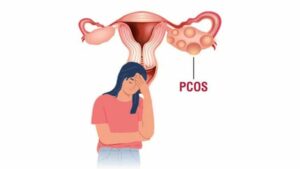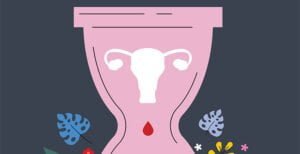Are you one of the many women grappling with the challenges of Polycystic Ovary Syndrome (PCOS)? You’re not alone. PCOS is a common hormonal disorder affecting women of reproductive age, often accompanied by irregular periods, ovarian cysts, and hormonal imbalances. The journey to managing PCOS can be overwhelming, but fear not – this blog is your compass through the maze of PCOS treatment options. From lifestyle changes to medical interventions, we’ll explore a range of approaches to help you make informed decisions about your health. Let’s embark on this empowering journey towards holistic well-being.
Contents
What is PCOS?

Polycystic Ovary Syndrome (PCOS) is a common hormonal disorder that affects people with ovaries, typically during their reproductive years. It is characterized by a combination of symptoms, which can vary from person to person. The key features of PCOS include:
- Irregular Menstrual Cycles: Women with PCOS often experience irregular or infrequent menstrual periods. Some may also experience heavy bleeding.
- Ovulatory Dysfunction: PCOS can lead to irregular ovulation or the absence of ovulation, which can affect fertility.
- Ovarian Cysts: Small fluid-filled sacs called cysts may form on the ovaries. Despite the name “polycystic,” not all individuals with PCOS develop cysts, and the presence of cysts alone is not diagnostic of the syndrome.
- Hyperandrogenism: Elevated levels of androgens, which are male hormones that females also produce, can lead to symptoms such as acne, hirsutism (excessive hair growth in areas where males typically grow hair), and male-pattern baldness.
- Insulin Resistance: Many individuals with PCOS have insulin resistance, where the body’s cells do not respond effectively to insulin. This can lead to elevated insulin levels and an increased risk of Type 2 diabetes.
PCOS is a complex condition, and its exact cause is not fully understood. Genetics, insulin resistance, and hormonal imbalances play a role in its development. PCOS can impact a woman’s overall health and quality of life, and it is often associated with an increased risk of other health conditions, including diabetes, cardiovascular issues, and endometrial cancer.
Different PCOS Treatment Methods
PCOS (Polycystic Ovary Syndrome) treatment typically involves a combination of lifestyle modifications, medications, and, in some cases, fertility treatments. The specific approach varies depending on individual symptoms, health goals, and whether the person is trying to conceive. Here are different PCOS treatment methods:
Lifestyle Modifications

Lifestyle modifications play a crucial role in managing the symptoms of Polycystic Ovary Syndrome (PCOS) and improving overall well-being. Here are some key lifestyle changes that may be beneficial for individuals with PCOS:
Healthy Eating Habits:
- Balanced Diet: Focus on a balanced diet that includes a variety of nutrient-dense foods such as fruits, vegetables, whole grains, lean proteins, and healthy fats.
- Low-Glycemic Foods: Choose low-glycemic foods to help stabilize blood sugar levels. This includes whole grains, legumes, and non-starchy vegetables.
- Limit Processed Foods and Sugars: Reduce the intake of processed foods, sugary snacks, and beverages, as they can contribute to insulin resistance.
Regular Exercise:
- Aerobic Exercise: Engage in regular aerobic activities such as walking, jogging, cycling, or swimming. Aim for at least 150 minutes of moderate-intensity exercise per week.
- Strength Training: Include strength training exercises to build muscle mass, which can contribute to improved insulin sensitivity.
Weight Management:
- Maintain a Healthy Weight: Achieving and maintaining a healthy weight can help regulate menstrual cycles, improve fertility, and reduce insulin resistance.
- Gradual, Sustainable Changes: Focus on making gradual and sustainable lifestyle changes rather than opting for extreme diets or rapid weight loss, which may be difficult to maintain.
Stress Management:
- Relaxation Techniques: Practice stress-reducing techniques such as deep breathing, meditation, yoga, or mindfulness to manage cortisol levels and promote overall well-being.
- Adequate Sleep: Prioritize getting enough quality sleep each night, as inadequate sleep can contribute to hormonal imbalances and increased stress.
Hydration:
- Drink Plenty of Water: Stay well-hydrated by consuming an adequate amount of water throughout the day. Water is essential for overall health and can aid in digestion and metabolism.
Medications
Medications can be an integral part of the treatment plan for Polycystic Ovary Syndrome (PCOS), helping to manage symptoms and improve overall health. The choice of medications depends on the specific symptoms and goals of the individual. Here are common medications used in the management of PCOS:
Oral Contraceptives (Birth Control Pills):
- Purpose: Oral contraceptives are often prescribed to regulate menstrual cycles and reduce symptoms such as acne and hirsutism (excessive hair growth).
- How They Work: Birth control pills contain hormones (estrogen and progestin) that regulate the menstrual cycle by preventing the overgrowth of the uterine lining and suppressing ovulation.
Anti-Androgen Medications:
- Examples: Spironolactone, flutamide, and finasteride.
- Purpose: These medications are used to reduce symptoms associated with elevated androgen levels, such as acne, hirsutism, and male-pattern baldness.
Metformin:
- Purpose: Metformin is often prescribed to improve insulin sensitivity, especially in individuals with PCOS who have insulin resistance or are at risk of developing Type 2 diabetes.
- How It Works: Metformin helps the body use insulin more effectively, reducing the risk of elevated blood sugar levels.
Ovulation-Inducing Medications:
- Clomiphene Citrate: This medication is commonly used to induce ovulation in women with PCOS who are trying to conceive.
- Letrozole: Another medication used to induce ovulation, particularly in women who do not respond well to clomiphene citrate.
Fertility Treatments

Fertility treatments are often considered by individuals with Polycystic Ovary Syndrome (PCOS) who are experiencing difficulties in getting pregnant. PCOS can affect fertility due to irregular ovulation or anovulation (lack of ovulation). Here are common fertility treatments that may be recommended for individuals with PCOS:
Ovulation Induction:
- Clomiphene Citrate: This oral medication is often the first-line treatment for inducing ovulation. It helps stimulate the ovaries to release eggs. Regular monitoring through ultrasound and blood tests may be conducted to track the response.
- Letrozole: Another medication, typically used for breast cancer treatment, is effective in inducing ovulation in women with PCOS. It is sometimes preferred over clomiphene citrate due to potentially fewer side effects.
Gonadotropins:
- Follicle-Stimulating Hormone (FSH) Injections: Injectable hormones may be used to stimulate the ovaries to produce multiple eggs. This is often employed in cases where clomiphene citrate or letrozole has not resulted in successful ovulation.
In Vitro Fertilization (IVF):
- Purpose: IVF is an assisted reproductive technology that involves fertilizing an egg with sperm outside the body and then implanting the embryo into the uterus.
- Procedure: Ovarian stimulation is performed using injectable hormones to produce multiple eggs, which are then retrieved and fertilized in a laboratory. The resulting embryos are then transferred into the uterus.
Intrauterine Insemination (IUI):
- Purpose: IUI involves placing sperm directly into the uterus during the woman’s fertile window, increasing the chances of sperm reaching the egg for fertilization.
- Suitability: IUI may be recommended in cases where there is mild male factor infertility or when there are ovulatory issues.
Nutritional Supplements
Nutritional supplements can be a complementary approach in the management of Polycystic Ovary Syndrome (PCOS). While supplements should not replace a balanced diet, they may offer additional support by addressing specific nutrient deficiencies or targeting symptoms associated with PCOS. Here are some common nutritional supplements that may be considered:
Inositol:
- Purpose: Inositol, specifically myo-inositol, has shown promise in improving insulin sensitivity and ovarian function in women with PCOS.
- How It Works: Inositol is involved in insulin signaling, and supplementation may help regulate insulin levels. It may also support regular menstrual cycles and improve fertility.
Vitamin D:
- Purpose: Vitamin D deficiency is common in individuals with PCOS and is associated with insulin resistance.
- How It Works: Adequate vitamin D levels are important for overall health and may contribute to improved insulin sensitivity and reproductive outcomes.
Omega-3 Fatty Acids:
- Purpose: Omega-3 fatty acids, such as those found in fish oil, may have anti-inflammatory effects and can support cardiovascular health.
- How It Works: Omega-3s may help reduce inflammation in the body, which can be beneficial for individuals with PCOS who often have elevated levels of inflammation.
Chromium:
- Purpose: Chromium is a trace mineral that plays a role in insulin action.
- How It Works: Some studies suggest that chromium supplementation may improve insulin sensitivity, making it potentially beneficial for those with PCOS and insulin resistance.
Surgery

Surgery is not typically a first-line treatment for Polycystic Ovary Syndrome (PCOS), and it is usually considered in specific cases where other treatment options have not been successful, or when there are additional complications. One surgical option that may be considered in certain situations is ovarian drilling. Here’s an overview:
- Ovarian Drilling:
- Purpose: Ovarian drilling is a surgical procedure that involves making small punctures or using laser energy to create tiny holes in the surface of the ovaries.
- How It Works: The purpose of ovarian drilling is to disrupt the thickened ovarian capsule, which can lead to the release of eggs more regularly and improve ovulation.
- Indications: This procedure may be considered in cases where ovulation-inducing medications like clomiphene citrate or letrozole have not been successful, and fertility is a primary concern.
It’s important to note that ovarian drilling is not a guaranteed solution, and its effectiveness can vary. The procedure is usually performed laparoscopically, which involves making small incisions and using a camera and surgical instruments to operate. Recovery time is generally quicker compared to traditional open surgery.
Conclusion
In conclusion, the treatment of Polycystic Ovary Syndrome (PCOS) is a multifaceted and individualized approach that aims to address its diverse symptoms and improve overall well-being. Lifestyle modifications, including a balanced diet, regular exercise, and stress management, play a fundamental role in managing PCOS. These changes can contribute to weight management, insulin sensitivity, and hormonal balance.
Through a comprehensive and tailored approach, individuals with PCOS can navigate their unique health journey toward improved well-being.
If you are facing PCOS related issues, pcos treatment at HerMantra can help. Book your free trial online pcos treatment session now.


